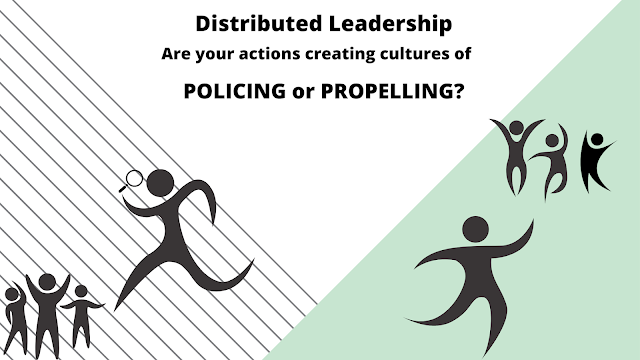Are you a leader that polices or propels your team?
The idea: As leaders we should be looking to propel our teams members forward much more than we police them. Sometimes, leaders with this intention of 'propelling', send too many messages of 'policing' through the everyday actions they take.
Now you might read the title and think this idea is so basic, obviously leaders must propel their teams forward instead of policing them. In my experience, many leaders say this, but they do not always live it. And the culture of an organization is built possibly more on what we do and less on what we claim to do or say. Let’s look at 3 examples of how our actions can send a policing message instead of a propelling one.
First, the difference.
‘Policing’ refers to an old school management style that uses monitoring and maybe some fear to have employees or teams adhere to rules. It is top-down and based on the fundamental belief that your team is not capable/ cannot be trusted to be responsible without supervision.
‘Propelling’ is used for a distributed leadership style in which leaders trust their teams with responsibility. They also amplify and share good work of team members so that others can learn or even be inspired by it. It is ground-up and is based on belief/trust in the capacity of the people you chose to be on your team.
So how might leaders say “We are here to propel our teams forward not police them” but can our actions contradict those words?
The mistake I have noticed over and over again is that leaders tend to focus most on managing the less initiated or low performers instead of the very motivated, high performing team members. Sure, some employees need more targeted support, but organization-wide policies and practices should be designed to reflect the culture of excellence that you are striving for, not to keep the less initiated in check.
Here are 3 of my own experiences to help illustrate this:
Story# 1 - School Policy:
I remember, several years ago, there were repeated cases of one or two teachers pulling out their cell phones for use during class time. It was established that this was not aiding the class in any way and was a clear lack of professionalism. After the Leaders notified them a few times, apparently it did not stop. So what followed? A slightly insane school wide policy in which all teachers in the school were not allowed to use their phones throughout the school day from 9 am to 4 pm! What did this achieve? It had no impact on the initial defaulters. But it did negatively impact the morale of the rest of us - the majority of committed, diligent teachers.
In every single school I have been in, leaders (including myself) have fallen victim to the harsh, lingering effect of the one or two team members who abuse a policy created on a culture of trust with the best intention. And too often, school-wide policing policies are put in place because of these few, sending your best employees (and hopefully the majority) a message that you do not trust them.
Story #2 - School Communication:
Leaders drive a lot of whole school communication. We have several opportunities to broadcast our ideas to the entire team. What we choose to say to this captive team audience during this time influences what the team believes about themselves and also their impression of what the organization believes about them. I remember one School Principal who never missed an opportunity to share her experiences with undesirable teacher behavior in an effort to help other team members avoid the same. The intention was 100% sincere, but the outcome was not as positive. What happened was that most of our communications and staff meetings were filled with these ‘cautionary tales’. There was far less inspirational dialogue around what we should be aspiring towards. And again, all these ‘warnings’ or policing, gave us the general feeling that the leaders were expecting us to fail soon.
Story #3 - The little everyday actions:
All the little actions you choose to take everyday can determine whether your team feels policed or propelled. Here is an example from one of my recent experiences. We were hosting a workshop for one of our school teams of about 25 people. For this workshop, the team needed to do some pre-work, without which the workshop would be a waste of time for any attendee. The workshop leader was deeply committed to making this a meaningful session for all participants and was determined to make sure that every participant came in prepared with the pre-work. Now based on our experiences, we would expect 2-4 members out of this 25 person group to miss this deadline without reminders. The vast majority of this team was extremely diligent. I was one of those 25 people attending it. We had 3 days before the session to do the work and had blocked time to complete it on the second day. During the course of these 3 days, I received 5 scheduled email reminders about completing the work. Now I consider myself to be a very conscientious team player and I’d be lying if I said each one of those emails didn’t automatically spark a subtle annoyance, even though I knew the workshop leader well and so I was sure it was fully well-intentioned. I know personally, as a workshop leader I would have chosen to not send the reminders, or maybe send just one that opened with the line “I know most of you have probably already done this, but just in case it slipped your mind…”.
It made me wonder - how was this making the other very committed, diligent team members feel? Was it worth policing this large majority of stellar employees for the very small minority of potential defaulters?
To me, every decision and action of leaders - big or small, sends subtle messages about our underlying beliefs. Do we believe in the team members we have chosen to bring on board and have faith in their abilities? Or Do we not have faith in their abilities and feel the constant need to monitor them and maybe prevent them from failing?
These subtle messages of ‘Policing’ or ‘Propelling’, or ‘doubt’ or ‘faith’ in team capability, shape the culture of our organization and the actions of our team members. Of course, even with trust and autonomy, simple checks and balances are needed too. But we need to ask ourselves if we are focusing more on these checks and balances instead of the core and often exemplary work of many of our employees. More on this in my next blog.
In conclusion, to be a leader that 'Propels', bring amazing team members on board, notice the amazing things they do, appreciate it so they know what to keep doing, share it so that others can aspire to do those amazing things too.





Comments
Post a Comment